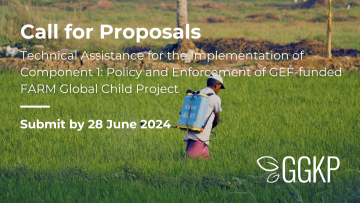
The Green Growth Knowledge Partnership (GGKP) seeks proposals from universities, research centres, think tanks and non-profit organizations to provide technical assistance for the implementation of Component 1 - Policy and Enforcement - of the Financing Agrochemical Reduction and Management (FARM) Programme for the global child project, with a specific focus on conducting a thorough scoping study and creating associated knowledge products and trainings. These efforts aim to identify and address gaps in policy and enforcement solutions related to pesticide and agricultural plastic management.
FARM is a five-year, $341 million initiative, which seeks to reduce and manage the use of harmful pesticides and plastics in agricultural production and encourage the adoption of low- and non-chemical alternatives. In addition to the global child project, FARM consists of seven child projects led by the United Nations Environment Programme (UNEP) and implemented by the Asian Development Bank (ADB), United Nations Development Programme (UNDP) and United Nations Industrial Development Organization (UNIDO).
The execution of the child projects is carried out in-country by the UN Food and Agriculture Organization (FAO) and relevant country institutions in Ecuador, India, Kenya, Lao PDR, the Philippines, Uruguay and Viet Nam. GGKP is the executing agency for the global child project.
Service Required
This technical assistance will be expected to include:
- A consultation or survey of FARM child projects to confirm and further refine the scope of the technical knowledge gaps on agrichemical related policy and enforcement solutions and needs (as listed in Table 1 below) and products needed to facilitate the child projects achieving their objectives; and a consolidated matrix or index of the knowledge resources and products that are planned by the child projects
- A scoping study to map existing sources of relevant information/ knowledge (e.g. among child projects, from global, regional, national or subnational partners, initiatives, institutions and experts; and prioritize the most relevant case studies to be adapted and promoted as knowledge products through FARM.
- Supporting the development of knowledge products based on the scoping study, including as relevant expert blogs, best practices, or case studies, etc.
- A recommendation for how child projects could use proposed tools including delivering thematic training to child project IAs and Eas based on the scoping study and knowledge products developed; and recommendations for how the global child project can engage in non-FARM countries to further replicate the programme results
- Conducting trainings and a policy event for FARM stakeholders
Qualifications
The selected entities shall meet the following minimum qualifications:
- Extensive fieldwork experience in the agricultural chemical and pesticide sector
- Familiarity with technical agricultural development programmes
- Prior experience with carrying out pesticide research projects on the ground
- Prior experience in conducting trainings to multiple stakeholders, particularly with farmers and women's organizations
- Prior experience with the GEF and/or other bilateral or multilateral development institutions
- Excellent command of the English language, both written and oral
In addition, the following qualifications are preferred, but not required:
- Ability to conduct consultation and lead discussions with multiple stakeholders
- Experience in agricultural research and monitoring
- Strong networks with farmers' organizations at country, regional and global level
Submission
Full details on submission requirements can be found here. Submissions are due 28 June 2024, no later than 17:00 CEST.
